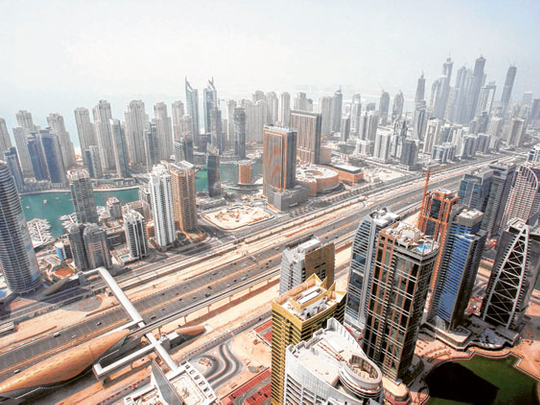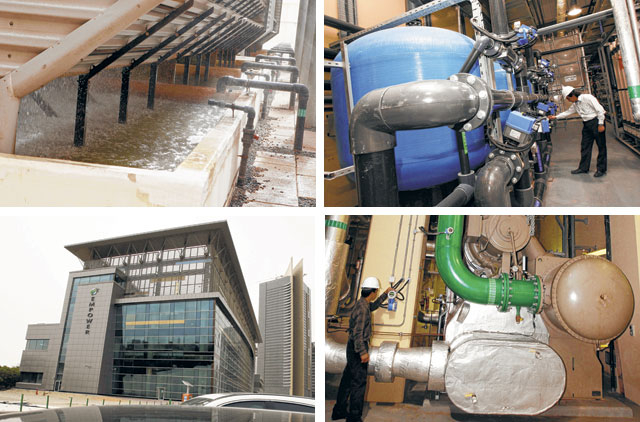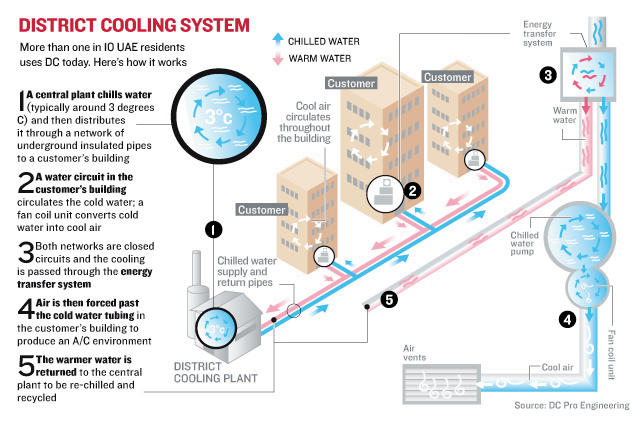
Dubai: When it was first introduced in the country in 1999, District Cooling (DC) was trumpeted as the best new thing in climate control.
Yet, 12 years down the line, the technology of choice in new developments continues to draw criticism, especially from property owners, over exorbitant bills.
In theory, DC is cost-effective, greener and provides much better cooling. It consumes up to 50 per cent less power compared to regular window, split ACs or rooftop chiller ACs. In a region where cooling accounts for up to 70 per cent of power produced, especially in areas with badly-designed buildings, it made a lot of sense to go in for DC.
"There is no doubt that district cooling must be part of a long-term national strategy," said George Berbari, chief executive of DC Pro Engineering and a founder of Tabreed, the UAE's first district cooling firm. "DC has great potential," he said.
Berbari pointed out a key challenge: electric utilities which charge either a flat rate or slab rate "do not favour district cooling".
DC currently accounts for 10 per cent of the cooling market in the UAE, where installed capacity is 2.2 million refrigeration tonnes (RT) - compared to just 2 per cent in the entire Gulf.
BAD REPUTATION
However, despite the obvious benefits, things have gone awry.
Already struggling to overcome the real estate crash, the fledgling industry has earned a bad reputation due to a vicious cycle of high flat fees based on area-based billing, leading to high service charges.
Complaints of overcharging for district cooling have reached boiling point. A common complaint of home owners or residents served by DC is that they pay as much as Dh800 for cooling per month - even in winter.
Online forums and blogs are abuzz with complaints about "fleecing" by DC companies charging ‘unreasonable' rates - not a good sign, considering that about 800,000 - or roughly one in every ten residents in the country - are using DC at home or at work.
The tug of war between DC providers and customers came to a head recently when residents of two towers in the upmarket JLT district had their air conditioning shut off for several days over unpaid fees.
In June 2010, Palm District Cooling (PDC) sent warnings to building owners on the man-made Palm Jumeirah and at Discovery Gardens warning them that their DC connection would be shut down after negotiations between PDC and the owners over cooling charges broke down.
Maria, a Latina who owns a 2,000 sq ft property in Dubai, is a poster girl for disappointed DC users. For her 2-bedroom unit, Maria said she pays Dh6,000 per year as "capacity charge", besides the variable consumption charge.
There's a flip side to Maria's story: tenants like Australian Lynn Naismith pay only between Dh40 and Dh60 per month for cooling their three-bedroom unit at one of the 40 sea-side Jumeirah Beach Residence towers. The reason: her landlord bears the cooling cost, which is included in the rent.
"This district cooling thing is expensive. They use a strange accounting system, which I don't understand. It's not user or customer-friendly at all," Maria told XPRESS. Berbari said DC firms slap a capacity charge to recover their investment but are struggling to achieve a 10 per cent rate of return. By connecting to a DC plant, the developer has reduced up to 12 per cent of his construction and infrastructure cost. "In many cases," he said, "that was not reflected in the price when the units were sold."
Regulation and metering
These are harbingers of much bigger problems: lack of regulations and lack of metering.
The chorus for government regulation of DC industry has been going on for years. Dr Abdullah Al Amiri, general secretary of the Emirates Energy Award, which recognises energy-efficient projects, has called for federal-wide regulations. "You cannot let them [producers] set the price," he said.
Experts say the regulator can be established along the lines of Singapore's Energy Market Authority, who has remit over the DC industry.
Hans Altmann, regional manager for Techem Energy Services Middle East, a German metering company in Dubai, said only regulations can save this industry.
"If DC firms are left to do their thing, people will lose faith in this industry and this will negatively affect the property market. I would not live in a district-cooled building as charges are unfair and non-transparent and I have no means of controlling consumption," said Altmann.
Regulations and metering are two sides of the same coin.
Empower, one of the five DC firms in Dubai, which has about 16,000 customers, started metering in 2007. While other DC providers have slowly adopted metering, Techem's in-house research shows that only one in five has sub-meters in Dubai.
Since the so-called capacity charge accounts for the lion's share of the cooling bill, it encourages mindless use. "It's human nature, if there's no reward or punishment," said Altmann.
This means, for example, that for a monthly cooling bill of Dh1,000, and a 20 per cent savings made by the end-user (which is big), the actual savings is only Dh40. Altmann said international standards prescribe that 80 per cent of the tariff should be variable and only 20 per cent set as capacity charge.
"Consumption is measurable. If you have no cost control, cost will spiral, and the service charge will spiral up next year again. It's a vicious inefficient cycle."
Berbari has urged authorities to discard power subsidies and adopt policies to boost DC use - such as charging lower power tariffs at night and encouraging use of treated sewage water to cool DC plants. "Power subsidies are unsustainable," said Berbari, who cited that Abu Dhabi charges only 15 fils per kW when actual production cost is 34 fils per kW.
In Dubai, he said, the 15 per cent increase in electricity tariff early this year, coupled with the slab tariff system "heavily punishes" DC operators resulting in a "double whammy": few DC firms make money while end-users complain of high tariffs.
"A lower night-time tariff would make DC more viable and we can pass the benefits on to the consumers," said Samer Khoudeir, chief sales officer of Empower.
Areas covered by DC in Dubai
The Palm, Marina, JBR, JLT, Dubai Healthcare City, Festival City, Discovery Gardens, The Gardens, Mirdif Gate Buildings, Business Bay, City of Arabia, Green Community, DIP, DMC, DIC, IMPZ, DOZ, Dubai Academic City
1A central plant chills water (typically around 3 degrees C) and then distributes it through a network of underground insulated pipes to a customer's building
4 Air is then forced past the cold water tubing in the customer's building to produce an A/C environment
3 Both networks are closed circuits and the cooling is passed through the energy transfer system
Chilled water pump
5 The warmer water is returned to the central plant to be re-chilled and recycled
Source: DC Pro Engineering
CONSOLIDATION
As the reach of the DC industry expands, there's concern about the long-term viability of some DC firms. Some built more than what was needed. Auditors of Tabreed said in August that the company's liabilities exceed assets by Dh5.2 billion.
Berbari estimates the UAE's total installed DC capacity at 2.2 million tonnes of refrigeration (TR) with only about half that capacity used.
"In Chicago, USA, there are only two DC firms," said Ahmad Bin Shafar, of Empower, "but Dubai alone has five. Consolidation, to only two DC firms, will allow us to achieve economies of scale."











